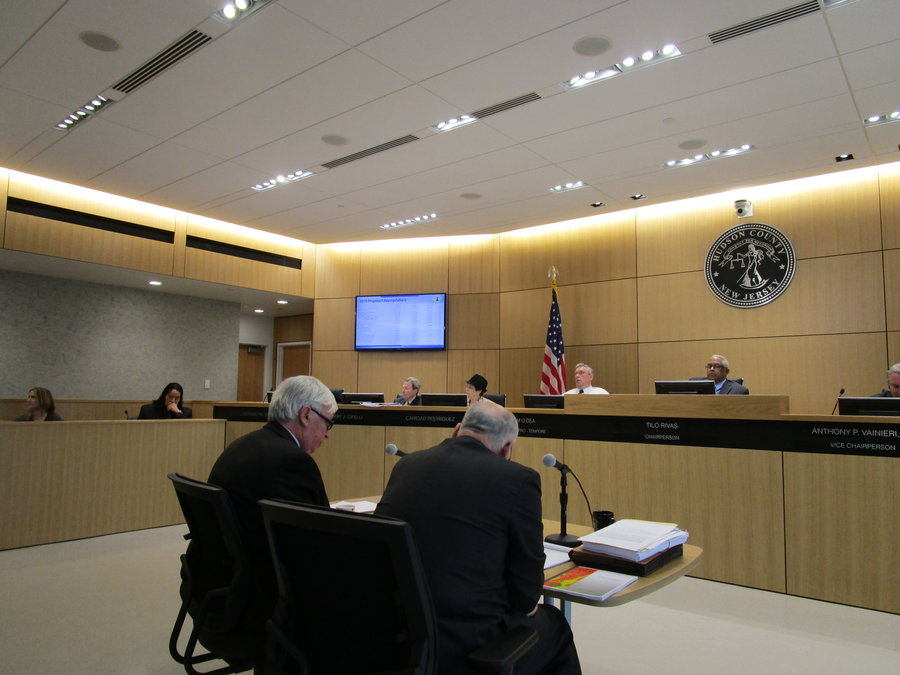A new county budget introduced on April 12 will probably increase the county tax portion of the property taxes paid by residents in Union City, Weehawken, Jersey City, and Hoboken.
Explaining that cuts in aid and salary increases are to blame, County Executive Tom DeGise said last week that the $529 million county budget introduced April 12 is $16 million higher than last year.
Because of the state formula governing how the budget costs are allocated to each town, Jersey City will see the largest increase this year, followed by Hoboken, Weehawken, and Union City.
Residents in those towns pay quarterly taxes that go to their city, the schools, and the county. The budgets from those three entities determine the overall tax rate they will pay. The county budget is struck each spring.
The budget has only been introduced, not finalized. It will be up for a final vote at a future meeting of the Hudson County Board of Freeholders. Residents and officials can make suggestions for changes until that time.
“The impact on the 12 municipalities will differ widely,” DeGise said. “Some towns will see their portion of the taxes go up, others will go down.”
Jersey City’s portion of taxes will rise by $10.5 million over last year, largely due to the massive increase in development in the city. Towns that have more properties paying taxes may share more of the budget.
“Even if this was a flat budget, six of the 12 towns would be paying more just from ratable growth.” – Tom DeGise
____________
What was unusual this year was the increase in Union City. DeGise said ratable increases around the county were a significant factor in the budget increase.
“Even if this was a flat budget, six of the 12 towns would be paying more just from rateable growth,” DeGise said.
Last year saw the third straight year of increased ratable base in the county with a significant 6 percent increase.
“Hudson County is thriving,” DeGise said. “Property values are up.”
While the increased rate of growth would have reduced the countywide tax rate by 9 cents this year, increased costs will actually cause the tax rate to rise by 4.2 percent, from $2.23 per thousand dollars of assessed value to $2.37. This is somewhat deceptive, since the county bills each town differ because they are divided among all the taxpayers.
Also somewhat deceptive is the average assessment on residential homes since several towns have not done a revaluation in a while, and their tax values do not actually reflect the rising values of homes. In Jersey City the average residential assessment is $93,500.
Significant loss in aid and increases costs are blamed for budget rise
A budget is made up of two parts: revenues, the income taken in through grants, state and federal aid, and taxes; and expenditures, the costs the county incurs to pay for salaries, benefits, programs, and tangible items.
This year, non-tax revenues declined, while the county implemented a number of programs that results in cost increases, DeGise said.
State aid that helps offset the cost for operating the county psychiatric hospital in Secaucus fell by $1.3 million.
The county also lost some of the revenue for operating its Transcend bus transportation system for seniors.
“The funding for this is generated by casino revenue in Atlantic City,” he said “This funding fell to a trickle.”
While the county tried to offset this loss by putting advertising on the sides of the busses, the program still required the county to cover $1.3 million in this year’s budget to maintain the program.
“We do not want to cut the bus service to seniors who might need it to get to doctor appointments and other appointments,” DeGise said.
The county also picked up the costs for lost aid to the three homeless shelters, allocating $92,000 to make up the difference.
Another significant impact on this budget was the increase in salaries for the Hudson County Prosecutor’s Office, noting that when the new prosecutor took over, the office had among the lowest wages of any county prosecutor’s office in state.
“We were 20th of 21,” he said. “We increased the salaries in order to keep our talent here.”
This accounted for an increase of $582,000 in this year’s budget.
As part of the county’s war on homelessness, it opened a warming center in Kearny. Instead of keeping it open just when the temperature reached freezing, the facility was kept open at all temperatures, costing an additional $300,000 in this year’s budget.
The Freeholder Scholarship program for Hudson County Community College accounted for an increase of $250,000 in this year’s budget.
This year also saw an increase in labor costs for the county Women and Minority Doing Business program whose staff rose from 3 to 6, and increased the salaries by $133,000, DeGise said.
Park improvements throughout the county accounted for $6.7 million in this year’s budget.
The budget also reflects a 1.7 percent increase in overall county salaries, this despite a reduction of staff from a one-time high of about 3,100 to about 2,973.
Health insurance costs rose by 7.1 percent accounting for about $4.5 million in this year’s budget. Pension payments cost $1.5 million.
With the introduction of the budget, the freeholders will begin their own reviews.
“We want you to look over and make recommendations for possible cuts,” DeGise said.
Department budget hearings will be held over the next month with a public hearing on the budget slated for late May.
Al Sullivan may be reached at asullivan@hudsonreporter.com.
